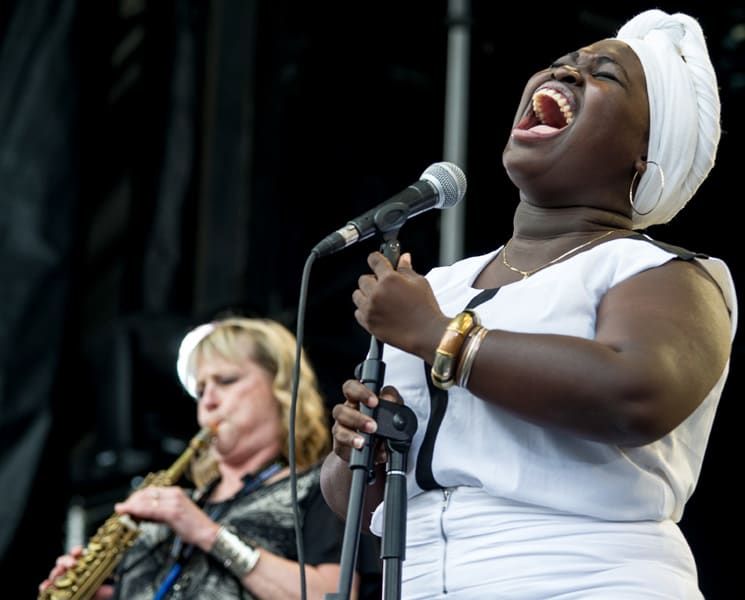Soprano saxophonist Jane Bunnett has played just about every conceivable jazz-friendly surface in the world, from tiny clubs to soft seat theatres to parades and beyond. This show was a tough assignment: kicking off a Monday night of free concerts at the biggest venue of the Montreal Jazz Fest, Scene TD, which can accommodate 10,000 people.
Needless to say, it was far from full at six p.m., making it all the more difficult to generate a vibe. Yet from the first note her recent Juno-winning project Maqueque made it seem so easy. One expects a certain fluid brilliance from Cuban music, but this was a superior example. Composed of piano, bass, drums, percussion (sacred bata drums and congas), vocals and Bunnett's sax and flute, they tore through the originals from their prize-winning album plus a few covers.
The most impressive aspect of this band is that, unlike so much Cuban jazz, which strives for a breakneck pace at which to hit the highest of high notes as some kind of badge of honour, this band didn't have to show off how great it was: from the very beginning, Bunnett's open-armed leadership set the tone for camaraderie instead of competition. Was it because this was an all-woman band who bought in to the project name, which means "spirit of a little girl"? Certainly the players were well-selected for ability and cohesion, and the teamwork was obvious on stage and as key to the band's sound as anything musical.
It was virtuosic but so relaxed, which made for an excellent programming choice in this timeslot getting the crowd's energy up as high as it could given the circumstances. How relaxed? Drummer Yissy Garcia chewed the same piece of gum at the same pace throughout the set, whether soloing energetically or tossing off some 6/8 rhythm like it was nothing. Highlights were "Tormenta," complete with a warning from Bunnett that this was a storm-bringing tune, and the band's theme song, "Maqueque." Bunnett has worked with Cuban idioms and musicians for more than 20 years now and this ensemble is one of her very best, most fully realized projects. In turn, she gave her very best to the band proving once again why she is one of Canada's finest jazz ambassadors.
Needless to say, it was far from full at six p.m., making it all the more difficult to generate a vibe. Yet from the first note her recent Juno-winning project Maqueque made it seem so easy. One expects a certain fluid brilliance from Cuban music, but this was a superior example. Composed of piano, bass, drums, percussion (sacred bata drums and congas), vocals and Bunnett's sax and flute, they tore through the originals from their prize-winning album plus a few covers.
The most impressive aspect of this band is that, unlike so much Cuban jazz, which strives for a breakneck pace at which to hit the highest of high notes as some kind of badge of honour, this band didn't have to show off how great it was: from the very beginning, Bunnett's open-armed leadership set the tone for camaraderie instead of competition. Was it because this was an all-woman band who bought in to the project name, which means "spirit of a little girl"? Certainly the players were well-selected for ability and cohesion, and the teamwork was obvious on stage and as key to the band's sound as anything musical.
It was virtuosic but so relaxed, which made for an excellent programming choice in this timeslot getting the crowd's energy up as high as it could given the circumstances. How relaxed? Drummer Yissy Garcia chewed the same piece of gum at the same pace throughout the set, whether soloing energetically or tossing off some 6/8 rhythm like it was nothing. Highlights were "Tormenta," complete with a warning from Bunnett that this was a storm-bringing tune, and the band's theme song, "Maqueque." Bunnett has worked with Cuban idioms and musicians for more than 20 years now and this ensemble is one of her very best, most fully realized projects. In turn, she gave her very best to the band proving once again why she is one of Canada's finest jazz ambassadors.
